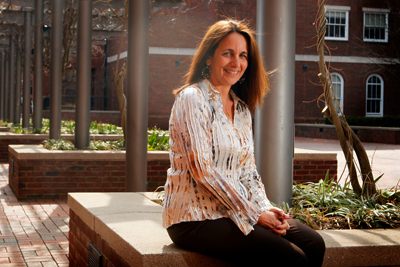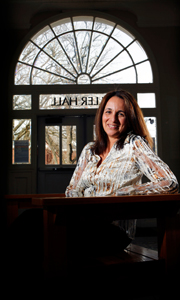During the height of the women’s movement in the late 1970s, a time when psychologists, sociologists, and others were finally beginning to talk about the problem of violence against women, Professor of Sociology Claire Renzetti was making her way through the academic jungle, earning her bachelor’s and subsequent degrees in sociology from the University of Delaware. Coming of age academically in this epoch shaped her academic interests and led to a career of studying the problem of violence against women, one she sees as everyone’s issue, not just a “women’s issue.”
 Renzetti had always been interested in understanding why people do what they do, but it took a few changes in her undergrad major before she finally arrived in the field she’s remained in, the criminology sub-field of sociology, where she focuses on the environmental factors affecting people’s actions.
Renzetti had always been interested in understanding why people do what they do, but it took a few changes in her undergrad major before she finally arrived in the field she’s remained in, the criminology sub-field of sociology, where she focuses on the environmental factors affecting people’s actions.
“To me it’s phenomenal how much has happened in a short time, in 30 years how much more we know,” said Renzetti of her field of study. During the past 30 years, researchers and practitioners have learned that rates of violence against women are shockingly high and that this violence is a global problem, though the way it happens is culturally specific. Violence against women is related to all kinds of social issues, and anyone can be a victim, but poverty is a risk factor.
Much progress has been made, yet “there’s a long way to go,” Renzetti noted. For example, large groups of women, such as women living in rural areas, still don’t have access to services. “So you just keep working at it and chipping away at the problem.”
Renzetti, who also serves as the Judi Conway Patton Endowed Chair in UK’s Center for Research on Violence Against Women, is a strong advocate for purpose-driven research. “I don’t think we do research for the sake of research,” she explained. “I feel my research has to have a practical purpose or impact.”
She notes that researchers and practitioners, people on the ground in the field serving battered women, bring different kinds of expertise to the problem and, thus, collaborations between them are invaluable. Research needs to be informed by what practitioners as well as the battered women themselves say is needed.
While research can provide an important service to practitioners, Renzetti says practitioners often don’t know how to seek help from researchers, so it is often the researchers who need to initiate contact with practitioners. Usually practitioners are eager to be part of collaborative research projects that can show whether their programs are working or need to be revamped. Research can also provide data that helps practitioners acquire funding for their work. On the flip side, without practitioners, researchers might never learn whether the ideas spawned by their research for addressing the problem really work.
Most recently Renzetti’s research has included a study, "The Least of These: An Ethnography of Faith-based Organizations Addressing Human Trafficking," of how religious beliefs motivate people to engage in social activism and, conversely, how that involvement impacts religious faith. She studied grassroots affiliates of International Justice Mission (IJM) to analyze the international, faith-based social justice movement against human trafficking. The study included addressing how members of the movement use moral authority to raise awareness of the problem, recruit others to the cause, and force governmental and legal responses to offenders and victims; how the movement is expanding “pro-life” to include human rights violations like trafficking; and how the movement allies itself with other anti-trafficking groups whose positions on other political issues contradict its own.
Exploring what ordinary people on a local level (she studied an IJM-affiliated group in Cincinnati) are doing to fight this social problem and discovering how their faith affected their fight spawned Renzetti’s interest in religiosity as a motivator for behavior. She says we tend to associate religiosity with certain types of social advocacy, such as conservative politics, but she is finding there is greater variety among evangelical Christians than that. “Sociologists always say they don’t stereotype,” she laughed, “but we do it all the time. Sociologists love to put people in categories.”
This IJM study has already led to two new studies: studying U.S. groups providing services to trafficking victims in order to identify a set of evidence-based best practices for meeting the unique needs of these victims; and working with Assistant Professor of Psychology Nathan DeWall to study how religiosity affects the quality of people’s intimate relationships and how they deal with conflict in those relationships.
 “One study has led in all kinds of directions,” said Renzetti. “That’s one of the great things about research, that you can have one project that leads to all these spin-offs.” Renzetti also loves the interdisciplinary nature of her field. The many factors affecting violence against women mean that it necessarily involves fields ranging from psychology and social work to law and health care professions to public health and sociology.
“One study has led in all kinds of directions,” said Renzetti. “That’s one of the great things about research, that you can have one project that leads to all these spin-offs.” Renzetti also loves the interdisciplinary nature of her field. The many factors affecting violence against women mean that it necessarily involves fields ranging from psychology and social work to law and health care professions to public health and sociology.
“One of the nice things about UK is that this interdisciplinary work is encouraged,” she said. Within two to three months of her arrival at UK last August, she was at a meeting organized by the director of the Center for Research on Violence Against Women for people from different fields interested in studying violence against women. DeWall was at this meeting, so within two to three months of arriving at UK, Renzetti already had a new interdisciplinary research project.
Renzetti also edits the 17-year-old international and interdisciplinary journal Violence Against Women, which began as a quarterly publication but by its fifth year was being published monthly. Having enough research to sustain a monthly journal gives evidence to how large the problem of violence against women is.
With so much work on such a hard problem still to be done, Renzetti says it is motivating to work in a field that allows you to see the results of the work you do. “It’s always great getting your work published in prestigious academic journals, but when someone tells you they used your research to make a difference in their program or their life, that’s rewarding.”
She also is inspired by the survivors of violence. “You think nothing will surprise you again and then you hear another horrible story,” she admited. “But I am so amazed by the resilience of people who have had horrible things happen to them. Yet with a support network and services, they’re not victims forever. What they overcome with their own agency, that’s really pretty inspiring. That keeps it all in perspective.”
story by Kami Rice
photos by Mark Cornelison
